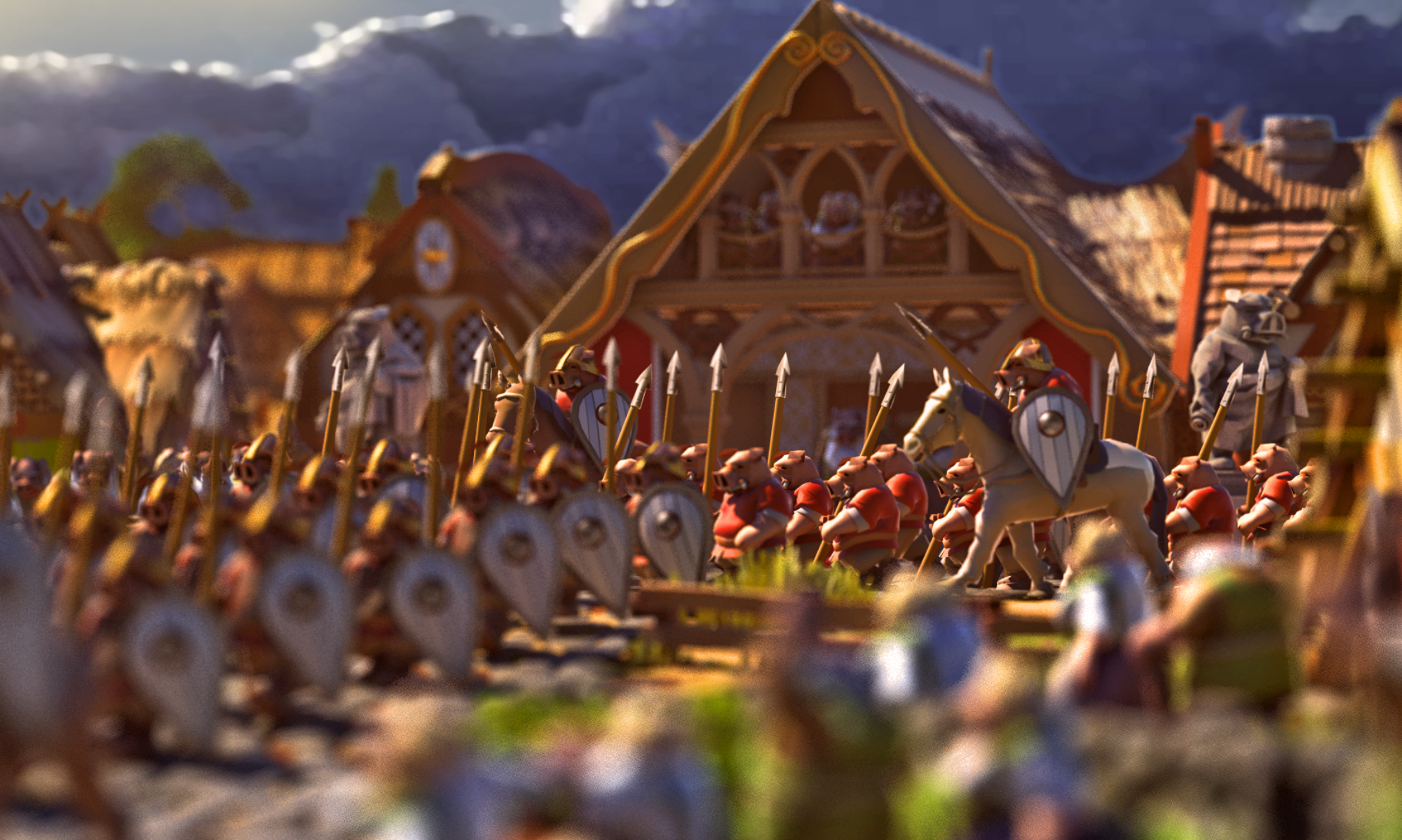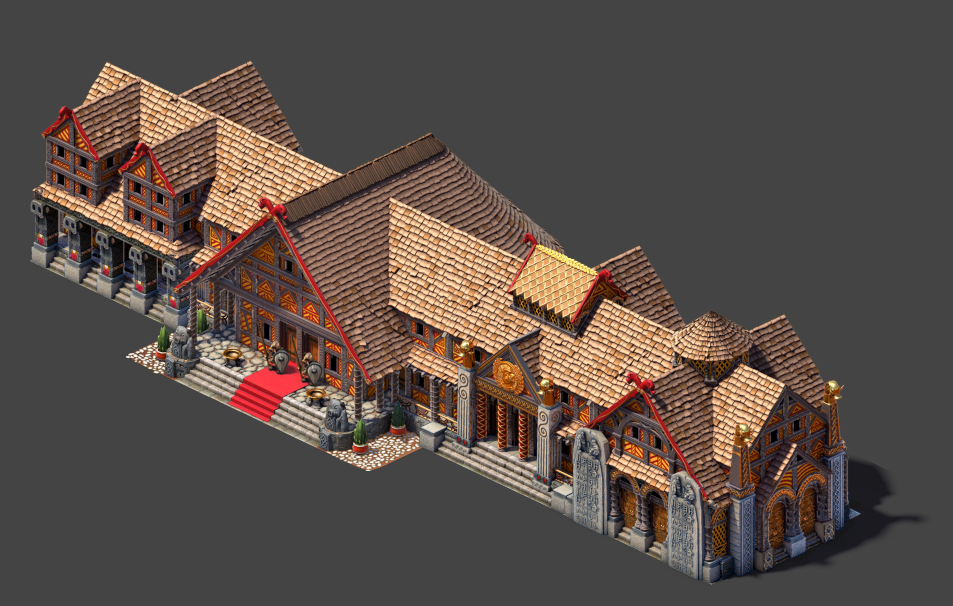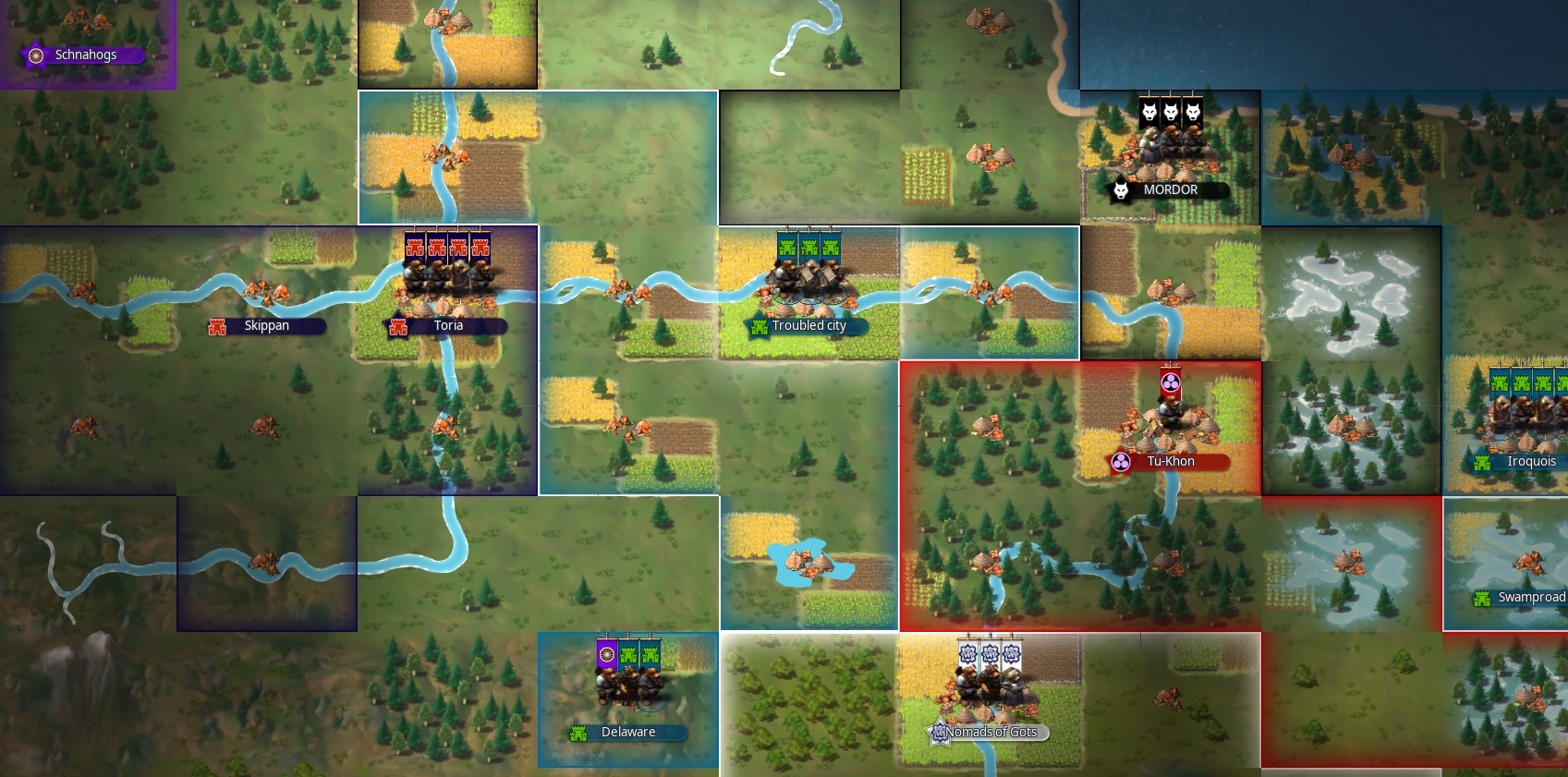It’s been a while since the last update. Indeed, as the game moves closer to “release”, I’m trying to favor less frequent updates with more content and hopefully more stable instead of faster paced more experimental ones.
This update represents many months of work and focuses on a complete redesign of war mechanics with the introduction of casus-bellis, war types, war morale and war automatic resolutions.
A long lasting issue with the game was caused by human nature and the inherent multiplayer nature of the game: players almost always refused to negotiate or make peace, and every single war would escalate into a war of total annihilation as it was always considered better than leaving a potentially vengeful player around.
This however was detrimental to the game and created an effect of condensing all wars in early days then to leave the server uneventful once the initial cleansing was over.
Cleansing that was often done by veterans ganging up on anyone they didn’t know around them simply because of risk management.
The goal of this update is to add rules of war to counter the suicidal and intransigent behavior of players so that it creates more realistic conflicts and reduces the better spans war across the game’s progress instead of everything happening in the early days, as it will be harder to insta-eliminate players in a single war.
Casus-bellis
Wars now require a motive to be started. This then defines the war type, each one with its specific properties.
The war types comes with predetermined war resolution effects which are applied when either side wins the war.
Politics Points
This update replaces Honor with Politics Points, which are now used to perform some actions and especially declaring wars or signing treaties with some specific terms such as Joining a Nation.
Politics Points are produced by having a positive Legitimacy. The higher the legitimacy the more points.
Like Honor, Politics Points are also used as a commitment to respect treaties and it is lost if illegally breaking a treaty. There’s now also a minimum engagement for all treaties.
War morale
Winning or losing a war is now defined by War Morale: each belligerent in a war has a war morale specific to the war, and if it reaches 0 the belligerent is auto-eliminated and war effects apply.
Of course it is still possible to end a war “manually” if both sides agree to peace, but experience shows this rarely happens hence this update.
The starting war morale is defined by the war type and casus-belli. War morale mostly only decreases, like the “life bar” in a fight.
The parameters reducing the war morale are also casus-belli dependent: for instance in an annexation war, it will be mostly who controls the target territory that affects war morale.
In other wars, it can be the proportion of territories being occupied.
Aggressors also often suffer a passive decay which insure wars can’t last for ever.
In most wars, battle results also affect morale based on the ratio of lost troops with your total armies.
War belligerents
Each war opposes 2 main belligerents: a main agressor against a main defender.
The war resolution effects only apply to the main belligerent, and a war ends only if a main belligerent is eliminated or capitulates (or signs a manual peace).
Other States can also participate in wars as co-belligerents. They can be eliminated individually from the war if their morale falls to 0, which does not end the war.
Co-belligerents are not affected by the war resolution effects. If they lose they are condemned to pay war reparations (pending the war resolution and only if their side loses), and are unaffected if the war is won. They participate strictly as allies of the main belligerent to help him in his goals.
Co-belligerence is mostly automatic: as a subordinate you are automatically called into the wars of your liege even if its a war where he is the attacker: a Nation king entering a war will therefore now have all its nation automatically at war with him as well, unlike before where it was only defensive.
While subordinates are forced into wars of their lieges, when its the other way around joining the war is optional for the liege: if a vassal declares war, he can chose to “call-to-arms” his liege which is free to refuse with no consequences or to accept and join the war as cobelligerent (bringing all its own vassals with him, escalating the war).
Note that nations still include a defensive pact making everyone of the nation enter as cobelligerent of the defender regardless.
Co-belligerents get a “war participation” score.
If a war ends and with a very low participation, the main belligerent can choose to publicly “denounce” them, inflicting a great political penalty.
This mechanic will allow players to punish fake allies or uncooperative vassals not fulfilling their duties.
War resolution
When a main belligerent is eliminated the war ends and its effects are automatically applied based on the war type. At any point a main belligerent can also chose to capitulate, thus triggering the auto-resolution of the war as well.
Effects generally include Political penalties and war reparations for the agressor if defeated.
For the defender the effects are more dependent on the war’s casus-belli: losing a territory in an annexation war, being forced to pay tributes, becoming subjugated, losing Victory Points etc…
These effects come as au automatic “armistice” diplomatic treaty between the 2 main belligerents which also creates a forced cease-fire during its engagement period with hefty penalties if broken.
That engagement period also depends on the war type.
Breaking treaties
Breaking some of these more serious armistice treaties (such as breaking a subjugation treaty) can now have more interesting consequences: instead of being either ignorable (and making the agressor unable to rely on it) or unbreakable because of honor penalties (and making the defender give up with no perspectives), what it does now is that it gives a special “punishment” casus-belli to the other party.
This allows to start a second war. However, if won again, this war will KILL the treaty breaker for good as he is deemed unreliable and rebellious, unworthy of negotiating.
This creates a dynamic of allowing a player who lost a war to still try an “all or nothing” rebellion, while the agressor can see this opportunity to finally get rid of an uncooperative player for good, offsetting the frustration of having to win a war a second time.
Rivalry
This update introduces “rivalry”, a new diplomatic status which comes with special effects. Most States can only design 1 rival State at the time.
Rivals can’t merge in a Nation and having diplomatic relations with your rival hurts Legitimacy. However, rivalry gives you different perks against your rival State: a special casus-belli of “humiliation” which slashes Victory Points of your rival by half if won, protects you against subjugation, gives war morale bonus, makes your cities more resistant to occupation, and reduces political costs to fabricate claims.
The top 5 nations also get something called “forced rivalry”: they are automatically rival with their superior in ranks: nation 5 auto-rivals nation 4, which auto-rivals nation 3 etc…
This will force the leading nations to oppose one another, and prevent the classic cartel strategy of veteran groups which remain split as different pretend-nations to farm more Victory Points then to merge and instawin the game before anyone can react.
It will now be in the interest of the big allied players to merge into a nation as soon as possible to prevent the risk of ending forced rivals, thus making Nations better reflect the reality of alliances.
Not only that, but joining another nation now comes with the effect of forfeiting 75% of your victory points, which will hopefully put a definitive end to this strategy of last minute nation merging.
Raiding
Raiding is now the default casus-belli which is always available and has a low cost of Politics to be started.
Raiding wars are particular that they do not auto-resolve and can only be won by manually ending it through a treaty, much like wars before this update.
However they only permit raiding: you cannot for example occupy enemy territories with this war.
Raiding battles have also been improved to become more viable.
It’s now finally possible to loot monies from raiding buildings: raided houses or production buildings give money pillaged from the population.
Pillaged government buildings give more money, which is taken from the enemy’s treasury as well.
And finally, the special buildings of the Palace and the Treasury, if pillaged, will transfer 20% of the defender’s treasury to the raiders, making those critical buildings to defend against raids.
The battle “AI” for raiding has also been improved, and is now better at choosing buildings to raid and to spread more efficiently for a faster battle.
It is also now possible to specify raiding targets to prioritize: resources or coins (or slaves, not implemented yet). You can also specify a particular resource category to prioritize (ex foods).
Battle engagements
In addition to the raiding battle improvements, I’ve also added the first battle options to affect the behavior of attackers during battle: you can now filter which “siege actions” a formation can perform in a battle: disabling breaching, climbing, or embarking.
This means you can for example send raiders with the order to do neither of these things, which will result in them only targeting things directly available in the area where they deploy instead of trying to cross a river and break in an impossible fort.
This is available for all battles: you can for example send an army only allowed to breach (gates & palisades), which will allow you to make sure that they wont be try climbing cliffs or walls, or wont try to cross water.
Pathfinding
Another big improvement of this update is the offloading of the first big game component into the Ymir c# DLL: regional pathfinding.
This means performances gains for server battles, as pathfinding is now much more efficient and can finally take advantage of multi threading which the current engine previously made impossible.
Larger battles can now be more fluid, with less “pauses” between each battle turn.
The pathfinding between different defensive areas of territories during battles has also been improved to be more accurate as a proper nodal-pathfinding system which should result in a better navigation of troops through complex fortified cities.
World news
Main world events such as war declarations and resolutions or important discoveries now generate automatic chronicles so that all players can be more aware of what’s going on and to make the world feel more eventful.
A global world channel has also been added in the diplomatic chat.
Next update
I’m well aware that since the increase in server load with the addition of countryside territories, the server lag has made late-game almost unplayable.
This update already includes some optimizations to improve things, but the next update will be one focused mostly on technical aspects to optimize the game by migrating more components to the c# dll.
It will also focus on a long list of pending “quality of life” features to reduce the time consumption of managing your State.
Servers
For the occasion of this new update, Server 5 is being restarted with a fresh new game at 18:00 Paris time.
Meanwhile, following community polls for the Server 1, its been decided to keep the Server 1 on the previous version for a few days. The server is being moved to the “previous version” branch meaning that to still play on it you must make sure to change your “beta” version to “previous version” in Steam (right click on the game > properties)
The Casus-belli update
v0.6.x
– reworked effect of treasury reserves on monetary unit values to lower its effect. effect is now factored by state’s total GDP.
– minimum distance of 1 tile between towers
– simplified forced distance between buildings (mine shafts, clay pits…) to be more rectangular on low distances (1 or 2) making it simplier to plan
– distance between mining shafts reduced to 1
– destroyed buildings (ex palace) no longer invalidate policies/territories relying on it
– pillaging the treasury or the palace steals 20% of the defender’s treasury each
– coins pillaged from government buildings (state power & admin) will affect the player’s treasury
– battles: optimized management of building districts for pillages
– battles: improved troops pathfinding between defensive layers
– implemented coins loot in pillage
– random territory events are now only for regional centers
– militias in invalid territory types (countrysides) now auto-disband
– added “steal tributary” casus-belli if trying to subjugate and already subjugated state (with the liedge state).
– added display of full title name in avatars of characters
– lowered max inter-state taxes to 15%
– partisans uprising odds are more likely when there’s no occupying forces on the territory or low forces compared to resistance amount
– moved “tributaries” knowledge (subjugation) after “council” instead of “governance” to be available earlier in game
– reduced base wealth of goods besides gold & silver by -25%
– increase Freetrader prices for stores of value (gold & silver) by 30%
– increased gold bar wealth to 2
– disabled speed boost event
– added politics points reward in startup missions to provided initial capital
– server save backups now auto-zip to prevent disk space overuse
– dynamic armistice durations for annexion wars based on quantity of annexed territories & importance
– non linear legitimacy penalty from political debts
– new casus belli “vengeance” if a defeated character illegally breaks its armistice treaty (ex after a subjugation) wich then kills the character if he is defeated again.
– moved techs “cuves” and ” barrel” to bronze age
– Politics points cost of fabricating claim is proportional to total population of target territory
– added averaged market sales incomes to state taxable incomes for inter-state taxes (nation & treaties)
– fixed many State income factors missing from inter-state taxable incomes
– Non capital hamlets & village are now disabled under City State policy
– movement cost on enemy territories increased by +200% (except claims)
– added ‘internal’ succession mode in nation (now default) which controls if character is available as a spawn
– implemented option to “denounce” co-belligerents that failed to honor their engagement in a war (no meaningful participation)
– harmonized stats of 4 alcohols crops: barley, sugarcane, apples, grapes
– increased & improved Free Traders prices decay from Free Traders stocks
– added war automatic resolutions and predetermined victory effects based on casus-belli type
– eliminated co-belligerents give auto rights of passage to all enemies until war ends
– new casus belli: liberate city, if a territory is lost from an annexion war
– formations in enemy territories are auto-repatriated to nearest regional center when hostilities cease.
– added global chat channel
– cleaned up and improved the “send missive” UI
– added signup political cost to “join nation” treaty term
– added minimum political engagement of 25 to treaties.
– added a confirmation event to launch military coup when ready, after completing the leadership mission.
– new sprite for potato fields
– new sprite for carrot fields
– changed apples into pleasure food
– new resource pumpkins as continental/oceanic basic food
– new resuorce turnips as nordic basic food
– potential fix for autowiped servers not changing world seed causing the same map to repeat.
– difficult techs can now require to complete innovation project multiple times before unlocking (ex Iron working)
– blocked overstacking researchers in innovation projects
– moved tavern service from social to entertainment as a placeholder measure.
– reduced work of military innovation projects to make them faster
– rustic house 4 cost +1 saw
– comfortable house 4 cost changed from 2 saws to 1 pickaxe
– comfortable house 3 cost -1 plaster -1 stonebloc -1 saw +1 life quality
– removed saws from paddock 3 building materials
– Philosophy idea easier to trigger
– added automatic chronicles for joining or leaving Nations
– blocked building platforms, walls, towers, or modify terrain heights near territory borders.
– added notification events for cobelligerants dragged into wars
– added automatic chronicles for war declarations & resolutions
– UI: improved world news menu
– added automatic chronicles for first discovery of important techs
– casus belli events can also provide a passive war morale bonus in case of war from other.
– new casus belli: breaking treaty ‘war’ clause creates a “broken treaty” casus belli for the other party instead of immediate war
– co-belligerants in a war do not trigger breaking clauses of treaties when force-entering a war (ex subordinates of the attacker)
– allow 100AP army to attack/invade adjecent tile even if total AP cost is above 100.
– changed treaties minimum duration in solo and persistant presets (increased)
– territories can only be transferred by treaty if other party has made a claim of it, or if transferring an occupation within a common war
– added “call-to-arms” request when declaring war for non-mandatory co-belligerents where they can choose to join the war or not
– cleanup UI code of event display
– distance from defender affects negatively initial war morale, based also on war type.
– added “fabricate claim” diplomatic action to gain an anexion casus belli
– new menu for war declaration to preview allies and war effects
– new war events & UI for ongoing wars to monitor belligerents, objectives, casus belli and progress.
– implementd possible timeouts for events (territory claims, choice events)
– choice events will default to 1st option if no choice is made before they timeout
– splitted armor weapon stat into 2: melee armor & ballistic armor
– heavy shield -0.5 melee armor, +1.5 ballistic armor
– wood, bronze, steel shield +1 ballistic armor
– longsword +1.5 damage +0.7 offensive skill
– battle axe reach -0.4, attack skill -1, defense skill +0.5, attack speed -5%
– characters lose 75% of their victory points when joining a different nation
– characters lose war morale when losing troops in battles, based on a ratio of troops-power lost / total military power
– partisans will now spawn as units of loyal character if that character is still at war with the region owner (instead of generic rebels)
– changed worker type of charcoal clamps and sawmills to woodcutters
– simplified design of events UI
– performances: migrated ‘bytemap’ datastructure to c# ymir dll
– performances: migrated pathfinding to c# ymir dll
– battles: removed cover bonus for non-defenders.
– added “rivalry” diplomatic action to designate another State as rival
– added “politics points” replacing honor and generated from positive Legitimacy.
– Nation leaders of top5 have automatic rivalry with nation leader of the rank above.
– trade offers of occupied territories are now disabled
– Increased resolution of flag icons x2
– fixed State ownership incorrectly changing in automated trades, making auto trade less viable and causing economic losses.
– fixed issues with meat production amounts and production skill points
– fixed bug of houses being destroyed during battles not showing up until reload
– fixed bug allowing to move ore shafts on invalid ore types
– fixed bug preventing countrysides/claims on some coastal territories
– fixed bug with administration penalty per nb of extra regions counting the capital
– fixed military actions on a tile with high AP cost leading to encampment on the territory instead of starting the action
– fixed bug of troops targeting same building in district when pillaging
– fixed bug blocking the upgrading of community hall because of Expansion Points
– fixed bug blocking disbanding entire formations directly
– fixed bug with goods price in production chains / state buying prices
– fixed glitch with brute huts in battles spawning 1 unit troops.
– fixed bug with starting mission events disapearing if losing capital or migrating
– fixed bug in state buying resources not accounting for levies rate
– fixed problem with occupation freeing after subjugation
– fixed UI bug of recruiting troops costs not considering state ownership
– fixed bug of settling on abandoned city giving empty previously attached countrysides
– fixed stored wealth not counting for population class wealth from privileges
– fixed bug allowing to change the territorial status of occupied territories
– fixed bug in events spawning ennemies where they appeared with defensive roles and retreated from battle
– fixed data refreshing issues on regional transfer routes modifications
– fixed bug with battle report cached data ending up partially corrupted if going back to world map while viewing an ongoing battle
– fixed formation events of deserting formations not deleting when obsolete
– fixed bug with population number when removing researchers from a project
– fixed bug of being able to complete the same mission multiple times
– fixed bug causing a server to be missing from the server list
– fixed bug of formation related events not disappearing (ex militia decay)
– fixed UI issue of Events menu constantly refreshing causing flickering.
– fixed bug allowing to access trading UI of occupied territories
– fixed bug of occupation actions failing on undefended territories because of combined cost of movement + occupation.
– fixed missing battle report events
– fixed glitches with event flags UI
– fixed bug causing state buying expenses in gift economy
Previous Patches:
– added military innovation to academia as a temporary gap-filler until it specific gameplay is implemented.
– rebalanced calculation of Free Traders buy price to better reflect average production costs.
– moved construction innovation to “construction” tech instead of “architecture”
– fixed error of expansion points check when trying to upgrade town halls.
– fixed bug of fish herds not loosing inventory from fishing actions
– fixed bug with scavenging cool-off not working
– lowered amount of fish resources per fish unit from 5 to 3
– national armies can no longer perform civilian actions (scavenge, woodcut, prospect, hunt… )
– fixed bug allowing to disband settlers in occupied territories
– rebalanced “plaster” idea trigger
– fixed culture conversion problem when releasing occupied territories
– reduced weight of knowledges in score calculation by 50%
– fixed bug with loyalty corruption in territories with 0 actives
– fixed UI issue needing a scroll to the government’s active policies tabs.
– fixed bug of invalid high resistance growth from occupied inactive or NPC characters
– fixed occupied territories upkeep still affecting treasury
– tile movement costs: removed “is settled” effect for enemy territories
– fixed networking issue affecting some players, especially in solo mode.
– problem with external IP not working for server listing
– State-buying does not deduct costs based on levy % for agricultural goods



